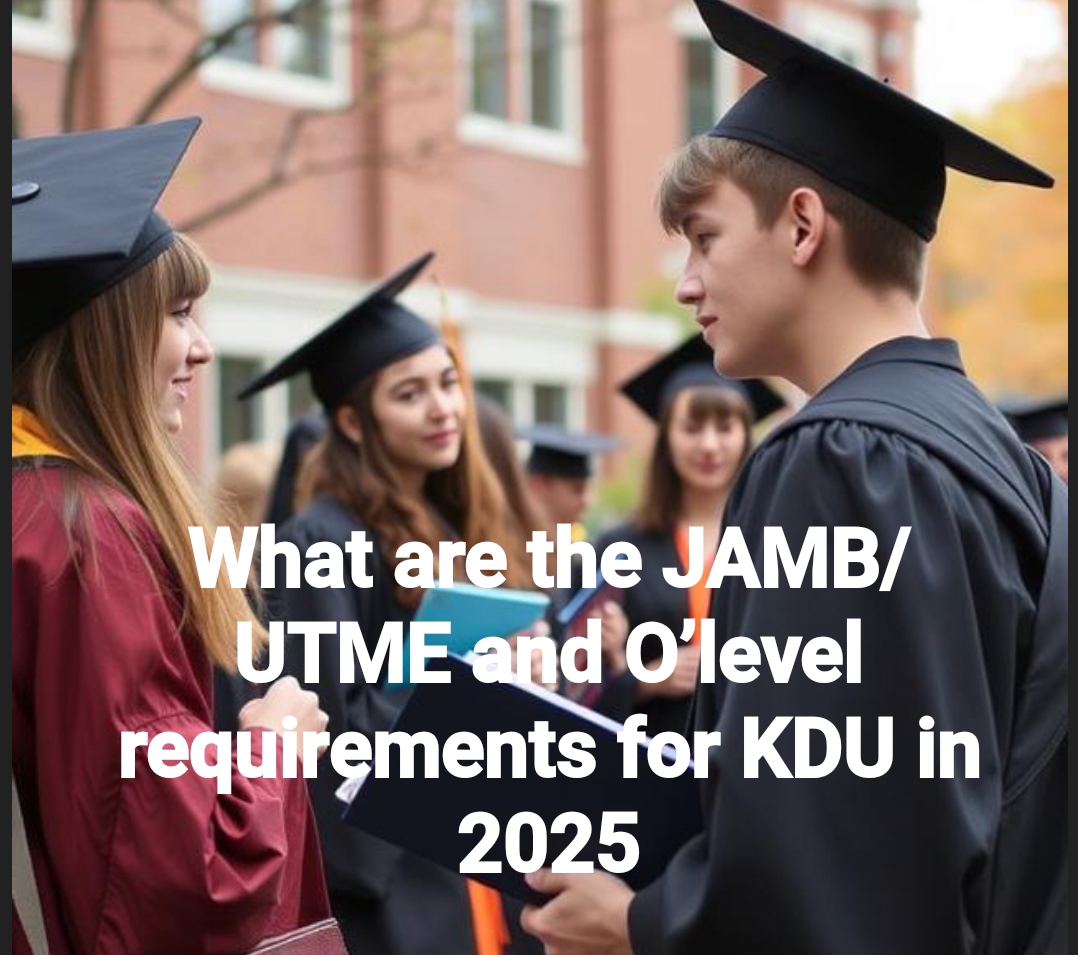What are the admission requirements for Michael & Cecilia Ibru University in 2025/2026

Thinking about applying to Michael & Cecilia Ibru University (MCIU) for the 2025/2026 academic session? You’re not alone! Many students, just like you, are searching for clear, reliable information on admission requirements—without the confusion of complex guidelines or outdated details.
I remember when I first started researching universities; the process felt overwhelming. Each school had different criteria, and I wasn’t sure where to begin. If you’re feeling the same way, don’t worry—this guide breaks down everything you need to know about MCIU’s admission process in simple, easy-to-understand steps.
Whether you’re a fresh high school graduate or looking to transfer from another institution, understanding MCIU’s requirements is the first step toward securing your spot. From academic qualifications to necessary documents, we’ll cover all the essentials—without any unnecessary fluff. Plus, we’ll share some helpful tips to strengthen your application, giving you the best chance of success.
Choosing the right university is a big decision, and having accurate information makes all the difference. So, let’s dive in and explore what it takes to join Michael & Cecilia Ibru University in the upcoming academic year!
How much is the tuition fee at Michael & Cecilia Ibru University for undergraduate programs
As of now, Michael & Cecilia Ibru University (MCIU) has not officially announced the tuition fees for its undergraduate programs for the upcoming academic session. This is common among private universities in Nigeria, as fee structures may be adjusted based on economic factors, institutional policies, or program-specific requirements.
What Students and Prospective Applicants Should Know
Since MCIU has not released updated fee details, here’s what you can do to stay informed:
Check the University’s Official Website – MCIU periodically updates its admissions page with the latest fee schedules. Visiting www.mciu.edu.ng or contacting the admissions office directly ensures you get accurate information.
Consider Program Variations – Tuition fees often differ based on the faculty (e.g., Arts, Sciences, Social Sciences). Past trends suggest that science-based programs may have slightly higher fees due to lab and equipment costs.
Additional Costs Beyond Tuition – While awaiting the official announcement, remember that university expenses include accommodation (if opting for on-campus housing), textbooks, and miscellaneous charges. Some students share that budgeting for these extras early helps avoid surprises.
Why the Delay in Fee Announcement?
Private universities like MCIU sometimes finalize fees closer to the academic year to account for inflation, operational costs, or new facilities. A student from the 2022/2023 session mentioned that the fees were communicated alongside admission letters, so applicants are advised to monitor their emails after applying.
Next Steps for Prospective Students
If you’re planning to enroll at MCIU:
Complete your application process early.
Follow the university’s social media pages for real-time updates.
While waiting for the official figures, focus on preparing other aspects of your admission, such as required documents and entrance exams. Rest assured, MCIU’s commitment to affordable quality education remains consistent, and transparency is expected once fees are finalized.
How much is the tuition fee at Michael & Cecilia Ibru University for undergraduate programs?
As of now, Michael & Cecilia Ibru University (MCIU) has not officially announced the tuition fees for its undergraduate programs for the upcoming academic session. This is common among private universities in Nigeria, as fee structures may be adjusted periodically to account for operational costs, facility upgrades, or changes in academic offerings.
What Prospective Students Should Know
While exact figures aren’t available yet, here’s what you can expect based on general trends at MCIU:
Faculty-Based Variations – Tuition often differs by program. Courses in Medicine, Law, or Engineering may have higher fees compared to Humanities or Social Sciences.
Additional Costs – Beyond tuition, students should budget for accommodation (if opting for on-campus housing), textbooks, lab fees, and miscellaneous charges.
Flexible Payment Options – Some private universities, including MCIU, may offer installment plans or scholarships for exceptional students.
How to Get the Latest Updates
Since fees aren’t fixed indefinitely, the best approach is to:
Check the University’s Official Website – MCIU’s admissions page or bursary section typically posts updated fee schedules.
Contact the Admissions Office – A direct inquiry via email or phone ensures you receive accurate, real-time information.
Connect with Current Students – Online forums or social media groups (like Facebook communities for MCIU students) can provide unofficial but helpful insights.
Why Transparency Matters
MCIU, like many institutions, prioritizes clear communication with prospective students. While waiting for the official announcement, use this time to research scholarships, compare programs, or explore financial aid options if affordability is a concern.
What are the admission requirements for Michael & Cecilia Ibru University in 2025/2026
If you’re considering applying to Michael & Cecilia Ibru University (MCIU) for the 2025/2026 academic session, understanding the admission requirements is crucial. While the university has not yet released the official guidelines for the upcoming session, the criteria typically follow a similar structure year after year. Below is a detailed breakdown based on past admission cycles and expert insights.
General Admission Requirements for Undergraduate Programs
O’Level Credits – Applicants must have at least five (5) credit passes in relevant subjects, including Mathematics and English, in WAEC, NECO, GCE, or equivalent exams. The credits must be obtained in no more than two sittings.
UTME (JAMB) Score – A minimum JAMB score is required (usually 140 and above, though competitive courses may demand higher scores).
Post-UTME Screening – MCIU conducts its own screening, which may include exams, interviews, or document verification.
Direct Entry (DE) Requirements – For candidates with A’Level, ND, NCE, or IJMB, the university accepts direct entry into 200-level, provided they meet the stipulated grades.
Faculty-Specific Requirements
Medicine & Health Sciences – Strong grades in Biology, Chemistry, and Physics are mandatory.
Law – High scores in Literature, Government, or CRS/IRS may be required.
Engineering & Tech – Credits in Physics, Chemistry, and Further Mathematics (where applicable) are essential.
Additional Considerations
Age Limit – Some programs may have age restrictions (typically 16+ for undergraduates).
Character Reference – A recommendation letter from a reputable source (e.g., a school principal or religious leader) may be requested.
Online Application – Candidates must complete MCIU’s application form and upload necessary documents (O’Level results, birth certificate, etc.).
Pro Tips for a Smooth Application
✔ Apply Early – Admission slots are limited, and early submission increases your chances.
✔ Double-Check Documents – Ensure all certificates are correctly uploaded to avoid disqualification.
✔ Follow Up – After applying, monitor your email and MCIU’s official portal for updates.
What If You Don’t Meet the Requirements?
If you’re short on credits, consider:
Retaking O’Level exams (WAEC/NECO) to improve your grades.
Exploring pre-degree or JUPEB programs (if MCIU offers them).
While MCIU’s 2025/2026 admission guidelines are yet to be officially announced, staying informed and preparing ahead will give you an edge. For the most accurate details, always check the university’s website or contact the admissions office directly.
Does Michael & Cecilia Ibru University offer scholarships for new students in 2025/2026
Yes, Michael & Cecilia Ibru University (MCIU) provides financial support to deserving students through its 150 scholarships and bursaries under the New Scholar’s Scheme. Each successful applicant can receive up to ₦1 million toward tuition fees, easing the financial burden for undergraduates.
Eligibility & Selection Process
To qualify, applicants must:
Have a minimum CGPA of 3.5 in their 100-level results.
Perform well in the post-UTME screening.
Submit a compelling personal statement outlining academic goals and extracurricular involvement.
Excel in the final interview stage, where communication skills and potential are assessed.
The university prioritizes merit and need, ensuring opportunities go to high-achieving students who demonstrate dedication.
What Makes MCIU’s Scholarships Stand Out?
Unlike generic financial aid programs, MCIU’s scholarships are competitive yet accessible, with clear criteria. Past beneficiaries highlight the transparency of the process—no hidden requirements. One current student shared:
“The scholarship allowed me to focus on studies without financial stress. The interview panel was supportive, assessing my passion, not just grades.”
Key Takeaways for Applicants
Start Early – Prepare documents (academic records, statement) ahead of deadlines.
Showcase Well-Roundedness – Leadership roles, volunteer work, or projects strengthen applications.
Prepare for the Interview – Practice articulating your academic ambitions clearly.
How do I apply for postgraduate studies at Michael & Cecilia Ibru University2025/2026
Applying for postgraduate studies at Michael & Cecilia Ibru University (MCIU) is a straightforward process, but it requires careful attention to details to ensure a successful submission. Below is a step-by-step guide based on the university’s official admission requirements and insights from past applicants.
Step 1: Check Eligibility Requirements
Before applying, confirm that you meet the minimum academic qualifications:
A Bachelor’s degree (at least Second Class Lower) from a recognized university for Master’s programs.
A Master’s degree (with a minimum CGPA of 3.5) for PhD applicants.
Some programs may require additional certifications (e.g., NYSC discharge certificate or professional qualifications).
Step 2: Visit the Official MCIU Postgraduate Portal
All applications are processed online via the MCIU Postgraduate Application Portal. Avoid third-party sites to prevent scams.
Step 3: Complete the Online Application Form
Provide accurate personal and academic details.
Upload scanned copies of required documents (degree certificates, transcripts, passport photo, etc.).
Double-check for errors before submission—mistakes can delay processing.
Step 4: Pay the Application Fee
After form submission, pay the non-refundable application fee via the portal.
Keep the payment receipt for reference.
Step 5: Submit & Monitor Application Status
Once submitted, you’ll receive an acknowledgment email.
Track your application status via the portal. Some departments may require additional screening (e.g., interviews or tests).
Apply early to avoid last-minute technical issues.
Reach out to the admissions office if you encounter delays—they’re responsive to inquiries.
Verify transcript submission rules—some schools require direct sending from your former institution



